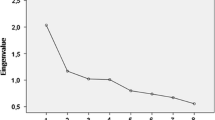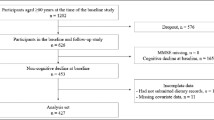Abstract
As the population of elderly people is growing rapidly, the number of individuals with dementia and cognitive impairment is also increasing. One of the preventive measures against cognitive decline is diet and different dietary factors have already been investigated. This review provides an overview of studies on dietary protein and cognitive functioning and cognitive decline. Also studies on the individual amino acids that are related to brain function, tryptophan and tyrosine, are discussed. Overall, the role of dietary protein intake on cognitive functioning as well as cognitive decline has hardly been studied; we found eight observational studies and three intervention studies. More studies investigated the role of tryptophan (14 studies) and tyrosine (nine studies) in relation to cognitive functioning, but all these studies were performed in young adult populations and mostly under special conditions. Research in elderly populations, in particular, is warranted. Also more research is needed to come to definitive conclusions and specific recommendations regarding protein intake or intake of specific amino acids for maintaining optimal cognitive functioning.
Similar content being viewed by others
References
Arnsten AF, Cai JX et al (1995) Dopamine D2 receptor mechanisms contribute to age-related cognitive decline: the effects of quinpirole on memory and motor performance in monkeys. J Neurosci 15(5 Pt 1):3429–3439
Ashcroft GW, Eccleston D et al (1965) 5-hydroxyindole metabolism in rat brain. A study of intermediate metabolism using the technique of tryptophan loading. I. Methods. J Neurochem 12(6):483–492
Auyeung TW, Lee JS et al (2011) Physical frailty predicts future cognitive decline—a four-year prospective study in 2737 cognitively normal older adults. J Nutr Health Aging 15(8):690–694
Backman L, Nyberg L et al (2006) The correlative triad among aging, dopamine, and cognition: current status and future prospects. Neurosci Biobehav Rev 30(6):791–807
Banderet LE, Lieberman HR (1989) Treatment with tyrosine, a neurotransmitter precursor, reduces environmental stress in humans. Brain Res Bull 22(4):759–762
Beasley JM, LaCroix AZ et al (2010) Protein intake and incident frailty in the Women’s Health Initiative observational study. J Am Geriatr Soc 58(6):1063–1071
Booij L, Merens W et al (2006) Diet rich in alpha-lactalbumin improves memory in unmedicated recovered depressed patients and matched controls. J Psychopharmacol 20(4):526–535
Buchman AS, Boyle PA et al (2007) Frailty is associated with incident Alzheimer’s disease and cognitive decline in the elderly. Psychosom Med 69(5):483–489
Colcombe S, Kramer AF (2003) Fitness effects on the cognitive function of older adults: a meta-analytic study. Psychol Sci 14(2):125–130
Cunliffe A, Obeid OA et al (1998) A placebo controlled investigation of the effects of tryptophan or placebo on subjective and objective measures of fatigue. Eur J Clin Nutr 52(6):425–430
Deijen JB, Orlebeke JF (1994) Effect of tyrosine on cognitive function and blood pressure under stress. Brain Res Bull 33(3):319–323
Deijen JB, Wientjes CJ et al (1999) Tyrosine improves cognitive performance and reduces blood pressure in cadets after one week of a combat training course. Brain Res Bull 48(2):203–209
Dougherty DM, Marsh DM et al (2007) The effects of alcohol on laboratory-measured impulsivity after L: -tryptophan depletion or loading. Psychopharmacology 193(1):137–150
Fernstrom JD (1983) Role of precursor availability in control of monoamine biosynthesis in brain. Physiol Rev 63(2):484–546
Fernstrom JD (2013) Large neutral amino acids: dietary effects on brain neurochemistry and function. Amino Acids 45(3):419–430
Fernstrom MH, Fernstrom JD (1987) Protein consumption increases tyrosine concentration and in vivo tyrosine hydroxylation rate in the light-adapted rat retina. Brain Res 401(2):392–396
Fernstrom MH, Fernstrom JD (1995) Brain tryptophan concentrations and serotonin synthesis remain responsive to food consumption after the ingestion of sequential meals. Am J Clin Nutr 61(2):312–319
Fernstrom JD, Fernstrom MH (2007) Tyrosine, phenylalanine, and catecholamine synthesis and function in the brain. J Nutr 137(6 Suppl 1):1539S–1547S (discussion 1548S)
Fischer K, Colombani PC et al (2002) Carbohydrate to protein ratio in food and cognitive performance in the morning. Physiol Behav 75(3):411–423
Goldman-Rakic PS, Brown RM (1981) Regional changes of monoamines in cerebral cortex and subcortical structures of aging rhesus monkeys. Neuroscience 6(2):177–187
Goodwin JS, Goodwin JM et al (1983) Association between nutritional status and cognitive functioning in a healthy elderly population. JAMA 249(21):2917–2921
Hansen RA, Gartlehner G et al (2008) Efficacy and safety of donepezil, galantamine, and rivastigmine for the treatment of Alzheimer’s disease: a systematic review and meta-analysis. Clin Interv Aging 3(2):211–225
Jakobsen LH, Kondrup J et al (2011) Effect of a high protein meat diet on muscle and cognitive functions: a randomised controlled dietary intervention trial in healthy men. Clin Nutr 30(3):303–311
Kaplan RJ, Greenwood CE et al (2001) Dietary protein, carbohydrate, and fat enhance memory performance in the healthy elderly. Am J Clin Nutr 74(5):687–693
Klafki HW, Staufenbiel M et al (2006) Therapeutic approaches to Alzheimer’s disease. Brain 129(Pt 11):2840–2855
La Rue A, Koehler KM et al (1997) Nutritional status and cognitive functioning in a normally aging sample: a 6-y reassessment. Am J Clin Nutr 65(1):20–29
Lieberman HR, Corkin S et al (1985) The effects of dietary neurotransmitter precursors on human behavior. Am J Clin Nutr 42(2):366–370
Luciana M, Burgund ED et al (2001) Effects of tryptophan loading on verbal, spatial and affective working memory functions in healthy adults. J Psychopharmacol 15(4):219–230
Magill RA, Waters WF et al (2003) Effects of tyrosine, phentermine, caffeine d-amphetamine, and placebo on cognitive and motor performance deficits during sleep deprivation. Nutr Neurosci 6(4):237–246
Mahoney CR, Castellani J et al (2007) Tyrosine supplementation mitigates working memory decrements during cold exposure. Physiol Behav 92(4):575–582
Markus CR, Panhuysen G et al (1998) Does carbohydrate-rich, protein-poor food prevent a deterioration of mood and cognitive performance of stress-prone subjects when subjected to a stressful task? Appetite 31(1):49–65
Markus CR, Panhuysen G et al (1999) Carbohydrate intake improves cognitive performance of stress-prone individuals under controllable laboratory stress. Br J Nutr 82(6):457–467
Markus CR, Olivier B et al (2002) Whey protein rich in alpha-lactalbumin increases the ratio of plasma tryptophan to the sum of the other large neutral amino acids and improves cognitive performance in stress-vulnerable subjects. Am J Clin Nutr 75(6):1051–1056
Markus CR, Jonkman LM et al (2005) Evening intake of alpha-lactalbumin increases plasma tryptophan availability and improves morning alertness and brain measures of attention. Am J Clin Nutr 81(5):1026–1033
McEntee WJ, Crook TH (1991) Serotonin, memory, and the aging brain. Psychopharmacology 103(2):143–149
Mendelsohn D, Riedel WJ et al (2009) Effects of acute tryptophan depletion on memory, attention and executive functions: a systematic review. Neurosci Biobehav Rev 33(6):926–952
Morgan RM, Parry AM et al (2007) Effects of elevated plasma tryptophan on brain activation associated with the Stroop task. Psychopharmacology 190(3):383–389
Neri DF, Wiegmann D et al (1995) The effects of tyrosine on cognitive performance during extended wakefulness. Aviat Space Environ Med 66(4):313–319
Nes M, Sem SW et al (1988) Dietary intakes and nutritional status of old people with dementia living at home in Oslo. Eur J Clin Nutr 42(7):581–593
Ortega RM, Requejo AM et al (1997) Dietary intake and cognitive function in a group of elderly people. Am J Clin Nutr 66(4):803–809
Pilcher JJ, Huffcutt AI (1996) Effects of sleep deprivation on performance: a meta-analysis. Sleep 19(4):318–326
Raina P, Santaguida P et al (2008) Effectiveness of cholinesterase inhibitors and memantine for treating dementia: evidence review for a clinical practice guideline. Ann Intern Med 148(5):379–397
Roberts RO, Roberts LA et al (2012) Relative intake of macronutrients impacts risk of mild cognitive impairment or dementia. J Alzheimers Dis 32(2):329–339
Salerno-Kennedy R, Cashman KD (2007) The relationship between nutrient intake and cognitive performance in people at risk of dementia. Ir J Med Sci 176(3):193–198
Sayegh R, Schiff I et al (1995) The effect of a carbohydrate-rich beverage on mood, appetite, and cognitive function in women with premenstrual syndrome. Obstet Gynecol 86(4 Pt 1):520–528
Schmitt JA, Jorissen BL et al (2005) Memory function in women with premenstrual complaints and the effect of serotonergic stimulation by acute administration of an alpha-lactalbumin protein. J Psychopharmacol 19(4):375–384
Sharp T, Bramwell SR et al (1992) Effect of acute administration of l-tryptophan on the release of 5-HT in rat hippocampus in relation to serotoninergic neuronal activity: an in vivo microdialysis study. Life Sci 50(17):1215–1223
Shurtleff D, Thomas JR et al (1994) Tyrosine reverses a cold-induced working memory deficit in humans. Pharmacol Biochem Behav 47(4):935–941
Sobczak S, Honig A et al (2003) Pronounced cognitive deficits following an intravenous l-tryptophan challenge in first-degree relatives of bipolar patients compared to healthy controls. Neuropsychopharmacology 28(4):711–719
Tam SY, Roth RH (1997) Mesoprefrontal dopaminergic neurons: can tyrosine availability influence their functions? Biochem Pharmacol 53(4):441–453
Thomas DE, Chung AOKO et al (1986) Tryptophan and nutritional status of patients with senile dementia. Psychol Med 16(2):297–305
Thomas JR, Lockwood PA et al (1999) Tyrosine improves working memory in a multitasking environment. Pharmacol Biochem Behav 64(3):495–500
Tieland M, van de Rest O et al (2012) Protein supplementation improves physical performance in frail elderly people: a randomized, double-blind, placebo-controlled trial. J Am Med Dir Assoc 13(8):720–726
USDA Agricultural Research Service (2013) Data tables: results from USDA’s 1996 Continuing Survey of Food Intakes by Individuals and 1996 Diet and Health Knowledge Survey. http://www.ars.usda.gov/main/site_main.htm?modecode=12-35-50-00. Accessed 26 Feb 2013
Winograd CH, Jacobson DH et al (1991) Nutritional intake in patients with senile dementia of the Alzheimer type. Alzheimer Dis Assoc Disord 5(3):173–180
Winokur A, Lindberg ND et al (1986) Hormonal and behavioral effects associated with intravenous l-tryptophan administration. Psychopharmacology 88(2):213–219
World Health Organization and Alzheimer’s Disease International (2012) Dementia: a public health priority. http://www.who.int/mental_health/publications/dementia_report_2012. Accessed 19 May 2012
Yeghiayan SK, Luo S et al (2001) Tyrosine improves behavioral and neurochemical deficits caused by cold exposure. Physiol Behav 72(3):311–316
Young VR (1990) Amino acids and proteins in relation to the nutrition of elderly people. Age Ageing 19(4):S10–S24
Conflict of interest
The authors declare that they have no conflict of interest and all authors have contributed to and approved the final version of the manuscript.
Author information
Authors and Affiliations
Corresponding author
Rights and permissions
About this article
Cite this article
van de Rest, O., van der Zwaluw, N.L. & de Groot, L.C.P.G.M. Literature review on the role of dietary protein and amino acids in cognitive functioning and cognitive decline. Amino Acids 45, 1035–1045 (2013). https://doi.org/10.1007/s00726-013-1583-0
Received:
Accepted:
Published:
Issue Date:
DOI: https://doi.org/10.1007/s00726-013-1583-0




